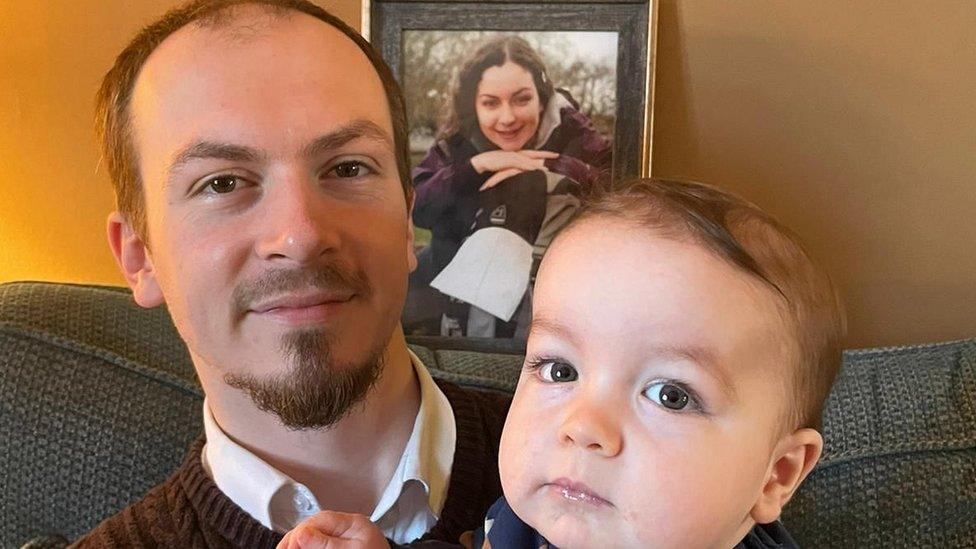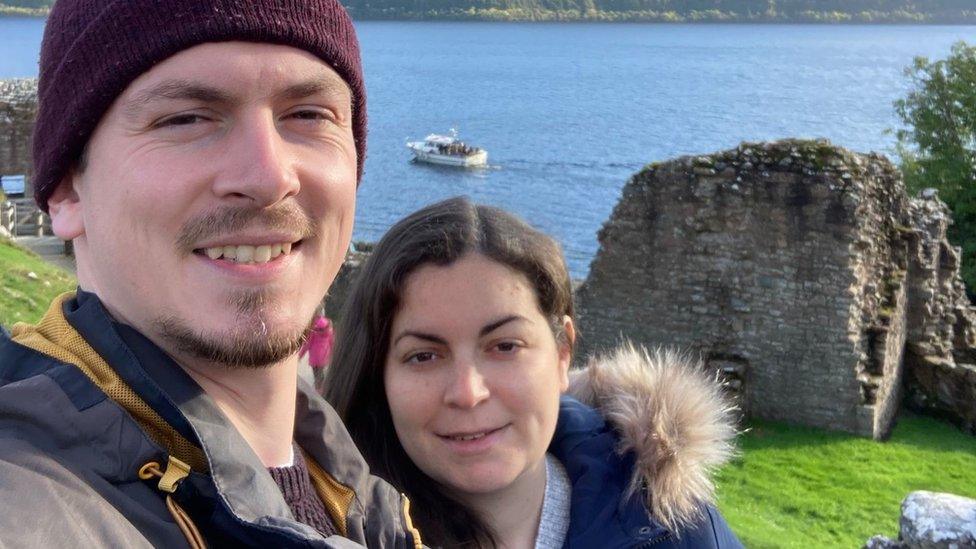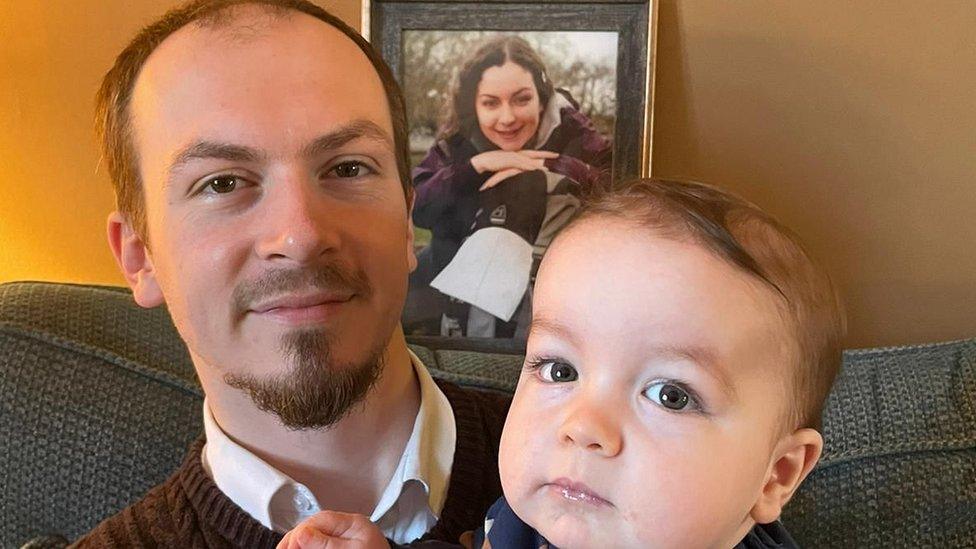Derby maternity deaths might have been prevented - report
- Published

Aaron Horsey with his son, Tim, and a picture of his wife Bernadette
Three women who died under the care of a hospital's maternity unit may have survived if earlier recommendations had been implemented, a report has said.
The cases occurred at University Hospitals of Derby and Burton (UHDB) NHS Foundation Trust over 16 months.
A review by the Healthcare Safety Investigation Branch (HSIB) also found a culture of intimidation and bullying and made safety recommendations.
The trust has apologised to the families of those affected.
In response to the report, it described the recommendations as "invaluable".
The report found that although there was no common theme to the deaths - and four other life-threatening cases that occurred in the same period - processes and leadership had been inconsistent and fragmented.
The HSIB said "robust action planning and prompt addressing of the learning" from previous recommendations from other investigations "may have had an impact on the outcome for the women who received care during the seven events included in this thematic review".
Significant issues
It also found the trust had significant staffing issues within its maternity service, with 45 midwife vacancies at the time the report was written.
However, HSIB said there was no evidence this had a direct impact on the cases.
While the report noted "a high level of comradeship amongst front-line staff within the midwifery and theatre teams" they said this was not universally replicated in the senior and leadership teams.
The review team found substantial evidence of poor behaviours, bullying and a hierarchical culture, especially within the obstetric team.
"This did not directly impact on the seven women whose care was being explored in this thematic review," the report said.
"There are significant issues that the trust needs to address, particularly around governance and leadership."
Six of the cases took place at the Royal Derby Hospital, while the other case involved a woman who died at home.

'I had no indications how unwell she was'

Bernadette (right) passed away within seconds of the birth of her son
Aaron Horsey, from Nottinghamshire, who lost his wife Bernadette at the trust, said she had been booked in at the Royal Derby for an elective Caesarean section on 19 January 2022.
He said Bernadette, who worked for Nottingham University Hospitals Trust, had chosen to have their baby in Derby in part due to concerns over maternity care services in Nottingham.
"The procedure seemed to go quite normally and we were told there was a bit of an increase in activity and Bernadette said she felt very strange," he said.
As their son was born, the surgeons allowed the couple a moment to look at him.
"He was there, screaming like a textbook baby. For me, that moment feels like it was forever, seeing him arrive," he said.
"I turned to Bernadette to say 'he's here' but she immediately slumped to one side.
"She was white-grey and had a very unusual breathing pattern which I recognised from doing some first aid training.
"She wasn't conscious any more. I was shouting at her, I was holding her arm and I gave her a really good squeeze.
"I caught the eye of the consultant anaesthetist and said 'She's not well'. Very quickly, someone grabbed me by the shoulder and pulled me away. I said to her 'I'm going to be right here'. Then I was taken out of the room."
He said he was taken to a room outside where one of the consultants told him Bernadette was in cardiac arrest and was later told she had died."
After the report was published, Mr Horsey said: "My first thoughts are with the other affected patients and their families. Whatever this review said, nothing could fix the situations we each found ourselves in.
"It is clear that Derby Hospital failed to learn from previous investigations and that impacted the patients included in this review. They must do better for future patients."
The family are waiting for an inquest into Bernadette's death.

The trust said it had asked the NHS Derby and Derbyshire Integrated Care Board to commission an independent review into seven maternity incidents that took place between January 2021 and May 2022.
It said the report had been designed to give the trust and the families involved assurance that all possible learning had been identified.
Dr James Crampton, UHDB executive medical director, said: "The seven incidents have had a longstanding impact on the families involved, so it was paramount to us to ensure we had utilised every possible opportunity for further learning and why we proactively requested this independent review.
"Although the review did not find any common themes that impacted on the outcomes for all the women involved, there has been learning for us as an organisation which we have taken very seriously, and the recommendations are invaluable in helping us further improve safety and the experience of women under our care."
The report made 26 findings, five recommendations and 10 safety prompts - areas for the trust to improve safety, which the trust said it had accepted.
"We have already addressed the report's immediate recommendations, including refining our existing major haemorrhage guidance and enhancing our emergency bleep process, and have put a comprehensive plan in place to rapidly deliver all other initial actions within the next three months," added Dr Crampton.
"We would like to reiterate our apologies to the seven women and families for the experiences they had and thank them for their strength in sharing their feedback, which we will commit to using to improve the experience and care we provide to others."

Follow BBC East Midlands on Facebook, external, on Twitter, external, or on Instagram, external. Send your story ideas to eastmidsnews@bbc.co.uk, external
Related topics
- Published21 December 2022
